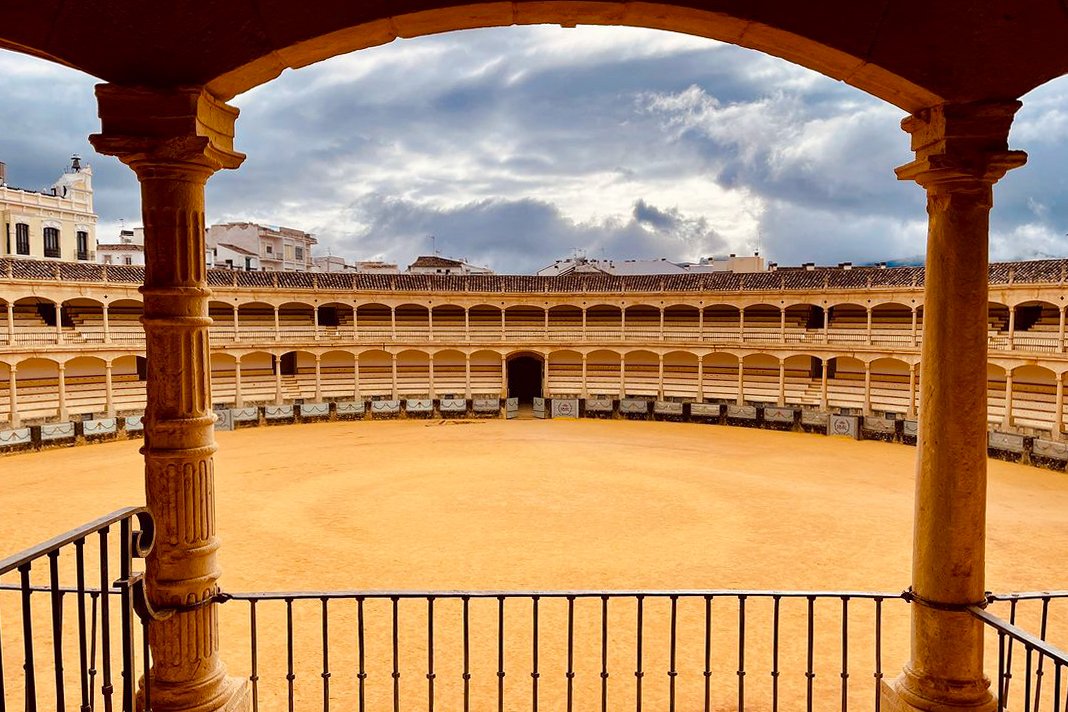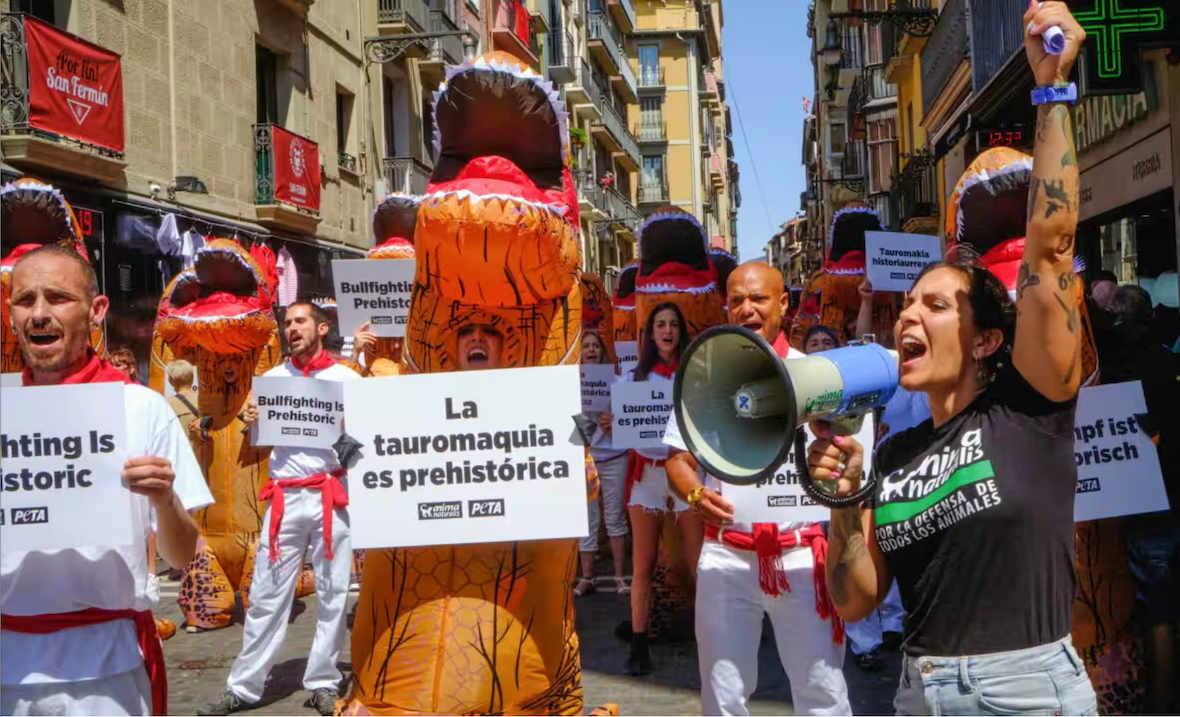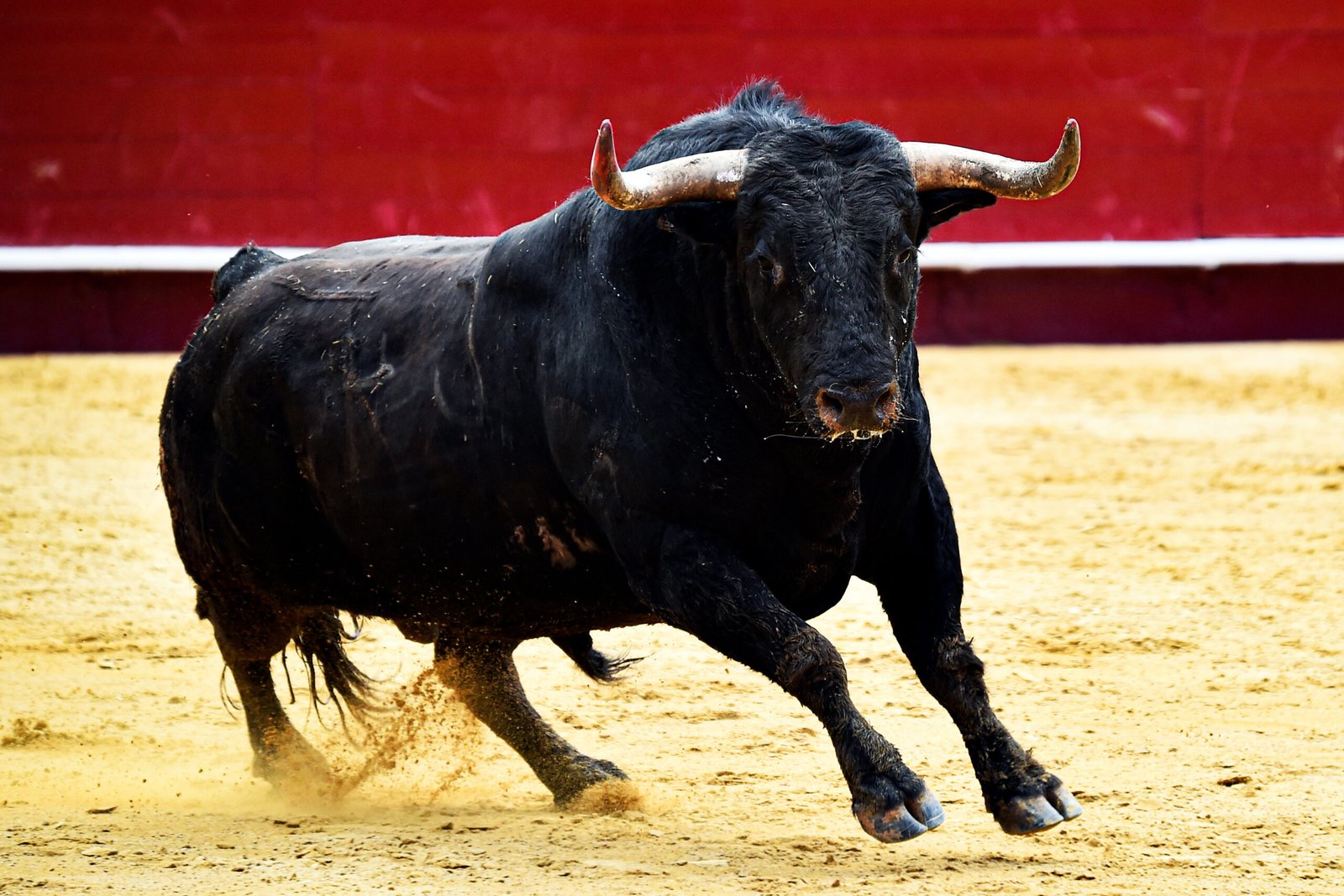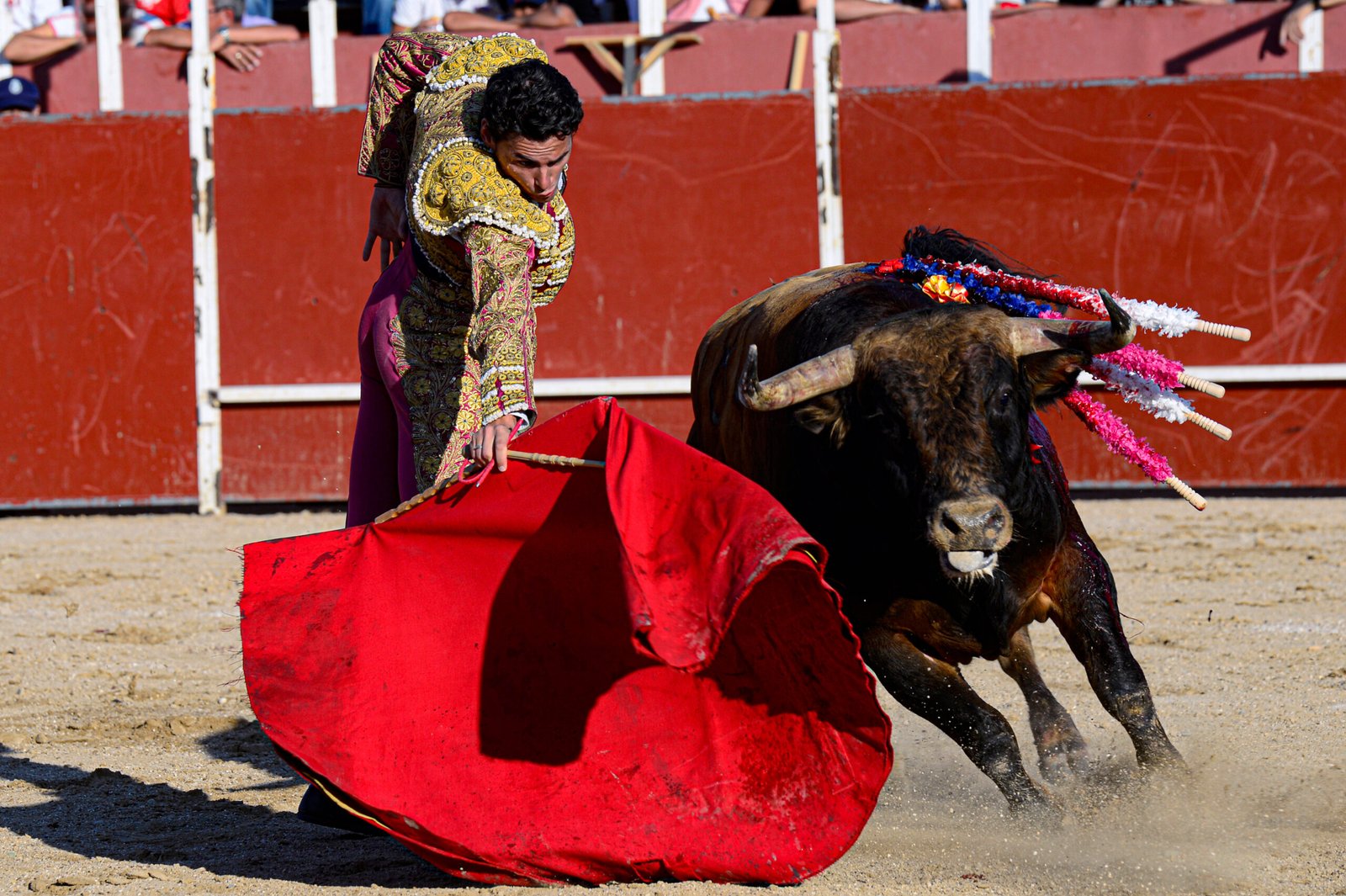The complex ethical reality behind Spain's most controversial cultural tradition—and what travelers need to know before participating
Years ago, I found myself at 6 AM on cobblestones older than America, surrounded by 2,000 strangers in white clothing, about to run with six fighting bulls and nine steers through medieval Pamplona. I was only able to run about 100 meters of the 875 meter course, but looking back now, I see how that experience informs how I understand cultural travel, and why superficial tourism never satisfies sophisticated travelers.
Pamplona’s San Fermín Festival isn’t just about bulls, it’s a week long celebration of Basque heritage, Catholic faith, culinary artistry, and community bonds that stretch back centuries.
(From Part 1 of this series: A Personal Story from San Fermín)
My experience of running with the bulls in Pamplona led me to several realizations that still inform me today as a luxury tour operator focussed on cultural travel. One of those realizations was about ethical travel in general, and specifically about bullfight tourism ethics.
In this third and final part of our San Fermín series we arrive at perhaps the most important questions: Can one be an ethical tourist and still experience a bullfight? What do Spanish people actually think about these traditions? How can travelers engage respectfully with controversial cultural practices?
These questions should matter deeply for anyone considering experiencing a bullfight in Spain, or visiting the San Fermín Festival—whether you choose to run, watch, or explore Pamplona’s rich culture beyond the bulls entirely. I’ve run with the bulls, attended a few bullfights, and have friends directly involved in the raising of fighting bulls. I’ve spent a lot of time thinking and researching what Spanish society really thinks about bullfighting tourism ethics.
This Guide Is Part 3 of Our Complete San Fermín Cultural Series:
Part 2: Pamplona Running of The Bulls 2026 Complete Travel Guide & Cultural Context
Where to stay, what to expect, and how to experience San Fermín respectfully.
Part 3: Bullfight Tourism Ethics: What Spanish People Think 2026
A data-driven look at bullfighting’s legacy, evolving views, and ethical alternatives for travelers. (YOU ARE HERE)
Ready to experience San Fermín authentically?
Our Pamplona cultural tours transform spectacle into meaningful cultural immersion.

The Plaza de Toros or Bull Ring in Ronda, Spain
Reality Check: What Spanish People Actually Think About Bullfighting
The romantic image of Spain as a bullfighting-obsessed nation doesn’t match contemporary reality. Recent data reveals a country deeply divided on its own traditions, with younger generations leading a quiet cultural revolution.
The Numbers Don’t Lie: Spain Is Moving Away from Bulls
Only 1.9% of Spanish people attended bullfighting events in 2021-2022, according to the Spanish Ministry of Culture. Even before COVID, attendance was just 8% in 2018-2019—down from 9.8% in 2006-2007.
The generational divide is stark: only 7% of Spanish citizens aged 16-24 support bullfighting, compared to 29% of those aged 55-65. A 2016 study by Ipsos MORI found that 58% of Spanish adults oppose bullfighting while only 19% support it.
Politics Follow the People: Government Catches Up
In 2024, Spain’s Ministry of Culture ended the National Bullfighting Award, citing evolving “society’s values and feelings.” Over 90% of citizen comments supported withdrawing the award.
More telling: over 715,000 Spanish citizens signed a 2025 petition to revoke bullfighting’s “cultural heritage” status—far exceeding the 500,000 signatures required to force Congressional consideration.

PETA Led an Anti-Bull Run Protest in Pamplona
What Changed My Mind: From Adventure Tourist to Cultural Guest
One Blessing Said It All
In Part 1 of this series, I wrote about how a newspaper vendor who blessed us “foreigners” before our bull run embodied something profound: while we were dumb young tourists seeking thrills, the locals were participating in traditions carrying deep cultural meaning. That blessing reflected genuine concern for our safety and respect for rituals we barely understood. Running with the bulls, with all it’s dangers to man and bull alike, embodies Pamplona’s homage to the martyr San Fermín.
Throughout our stay, Spanish families participated in religious processions, traditional music, and community celebrations having nothing to do with bulls. We foreigners fixated on the three-minute running spectacle within a 204-hour cultural festival.
Standing in that crowd of mozos years ago, I was seeking personal adventure. The Spanish mozos around me were preserving heritage. This difference fundamentally informs how I understand cultural tourism.
How Spanish Society Really Feels About Bullfighting: It's Complicated
Research involving 2,522 Spanish citizens identified distinct clusters of opinion that travelers to Spain should understand:
The Pro-Bullfighting Minority (19%) Generally older, rural, male residents who view bullfighting as integral to Spanish identity. They emphasize economic benefits, cultural heritage, and traditional artistry. This group sees international participation as validation of Spanish culture.
The Anti-Bullfighting Majority (58%) Predominantly younger, urban, female residents who prioritize animal welfare and view bullfighting as incompatible with modern values. They often welcome tourists but prefer engagement with alternative cultural expressions.
The Youth Resurgence Exception However, recent reporting reveals an intriguing counter-trend: among the small percentage of Spaniards who do attend bullfights, teenagers aged 15-19 are now the largest group, while those over 75 are least likely to attend. For some right-wing youth, associating with traditional Spanish symbols like bullfighting has become fashionable as a form of cultural rebellion. As one young seamstress who crafts bullfighting suits explains: “It is an art form; it is Spanish culture.”
The Conflicted Middle (23%) Citizens who appreciate cultural aspects while feeling uncomfortable with animal treatment. This “indifferent cluster” often determines political outcomes and reflects the complexity many travelers feel.
Where Old Traditions Meet New Politics
Separatist movements in Catalonia, Galicia, and Basque regions oppose bullfighting as a symbol of Spanish centralism. Catalonia banned bullfighting from 2010-2016 before Spain’s Constitutional Court overturned the ban.
Paradoxically, Pamplona sits in Navarre, a region with strong Basque identity, yet San Fermín remains deeply rooted in local culture. This contradiction illustrates how cultural practices resist simple political categorization
Why Money Makes This Debate So Complicated
Understanding the economics helps explain why this bullfight tourism ethics debate is so complex for Spanish communities—and why cultural heritage and economic necessity have become inseparably intertwined.
The Economic Reality Behind Cultural Arguments
Bullfighting generates approximately €1.5 billion annually and supports over 200,000 jobs, yet events declined from 2,684 in 2009 to 1,425 in 2019—a 47% decrease. This economic dependence creates a situation where cultural preservation arguments often reinforce economic necessity.
Tourism Industry: Cultural Preservationists or Economic Opportunists?
The relationship between culture and commerce becomes complex when examining tourism industry support. Academic research confirms that “foreign tourism initially bolstered the expansion of bullfighting in Spain”, but modern supporters genuinely blend cultural and economic arguments.
For example, Madrid’s San Isidro Fair generates approximately €70 million in tourist revenue annually, while Seville’s April Fair generates around €700 million, with significant portions from bullfighting-related activities. Yet tourism operators don’t simply exploit culture for profit—many genuinely view themselves as preserving Spanish artistic heritage while acknowledging economic benefits.
A young seamstress who crafts bullfighting suits explains: “It is an art form; it is Spanish culture… People are not aware of all the work that goes on behind it.” Her perspective reflects how economic participation (earning income from the industry) reinforces cultural conviction.
Rural Communities: Heritage Preservation Meets Economic Survival
Rural communities often depend on bull-related tourism while younger residents increasingly oppose the practices generating their income. Research shows rural depopulation influences bullfighting decline, suggesting these festivals serve as crucial economic lifelines for communities struggling with demographic and economic challenges.
This creates situations where cultural heritage arguments become intertwined with economic necessity—communities genuinely believe in preserving traditions while recognizing that international tourism validation helps sustain practices that might otherwise disappear.

A fighting bull or toro bravo slams on his brakes in the ring
The Hard Questions Every Spain Traveler Should Ask
Before participating in controversial cultural practices, thoughtful travelers must grapple with bullfight tourism ethics questions that have no simple answers.
Tradition vs. Animal Rights: Where Do You Stand? How do we balance respect for cultural traditions with concerns about animal suffering? Spanish supporters argue fighting bulls live better lives than industrial livestock; critics counter that intentionally making them suffer for any reason is ethically indefensible.
Are You Preserving Culture or Commercializing It? Does international participation preserve traditions through economic support, or transform authentic practices into tourist traps? San Fermín’s evolution from local religious festival to global tourism event illustrates this tension.
When Your Values Clash with Local Customs Should travelers participate in practices they find objectionable out of cultural respect? Or does authentic engagement require honest acknowledgment of ethical disagreements?
Who Pays the Price When Tourism Changes? How do we weigh animal welfare concerns against economic impacts on Spanish communities that depend on bull-related tourism?
How to Experience Spain's Culture Without the Cruelty or Controversy
Understanding Spanish culture doesn’t require participating in bull fighting. Countless alternatives offer authentic engagement while respecting diverse ethical perspectives.
Connect with Spain’s Spiritual Side
- Join daily religious processions honoring Saint Fermín
- Explore medieval architecture and Camino de Santiago connections
- Participate in traditional prayers and Catholic ceremonies like Semana Santa
- Learn about Basque cultural practices and regional history
Taste Your Way Through Spanish Culture
- Experience Navarre’s exceptional cuisine through cooking classes
- Visit organic farms and sustainable wineries
- Support traditional cheese producers and local agriculture
- Participate in farm-to-table experiences showcasing regional heritage
Join the Real Celebration
- Attend Gigantes y Cabezudos processions and traditional dance
- Join Basque language workshops or traditional music lessons
- Volunteer for cultural preservation or community support activities
- Participate in non-bull festival elements that comprise most of San Fermín
Discover Festivals Without the Drama Explore other Spanish festivals throughout the year that celebrate local culture without controversial elements. The wine fight of Haro (the hub of Rioja wine country) is a blast. The Fallas in Valencia are unforgettable. The Feria del Caballo in Jerez de La Frontera is beautiful, meaningful, and fun.
Your Travel Ethics Checklist: Making Smart Choices
Every traveler must decide for themselves how to engage based on personal ethics, cultural understanding, and respect for local complexity.
Before You Book: Ask Yourself These Questions
- Do your values align with financially supporting practices involving animal suffering?
- Have you educated yourself about historical, religious, and social contexts?
- Are you aware of meaningful alternatives that align with your ethical perspectives?
- Do you understand how your participation affects local communities?
If You Decide to Watch or Participate:
- Acknowledge cultural complexity and your position as a guest
- Educate yourself about historical and religious contexts
- Respect Spanish people who hold different perspectives
- Consider supporting animal welfare organizations to balance ethical concerns
- Engage actively with non-controversial festival elements
If You Choose a Different Path:
- Avoid judging Spanish people who participate in traditional practices
- Support local businesses and cultural institutions beyond bull-related tourism
- Share positive cultural experiences to promote alternative tourism
- Respect the legitimacy of different ethical perspectives
What I'll Tell You Today: Cultural Respect Over Adventure
Years after my San Fermín experience, I understand the difference between seeking personal adventure and participating respectfully in cultural heritage. Both motivations have validity, but recognizing the distinction matters for responsible travelers.
My Advice for Today’s Travelers
Understanding Spanish culture doesn’t require participating in practices that make you ethically uncomfortable. The most meaningful aspect of my experience wasn’t the adrenaline rush—it was moments of genuine cultural exchange that required humility, respect, and recognition that I was a guest in someone else’s tradition.
There Are Better Ways to Connect with Spanish Culture
Spain offers countless ways to engage authentically with its rich cultural heritage—through religious traditions, culinary arts, historical exploration, or community participation. Meaningful cultural exchange happens through genuine curiosity, respectful engagement, and acknowledgment of complexity.
Bottom Line for Ethical Travelers
There are no universally correct answers to ethical questions about cultural tourism. Spanish people themselves hold diverse perspectives on their own traditions. What matters is approaching decisions with cultural humility, ethical self-reflection, and respect for the complexity of cultural preservation in a globalized world.
The goal isn’t to judge Spanish culture by external standards, but to engage thoughtfully with practices that carry deep meaning for others while staying true to your own ethical framework. This balance—between cultural respect and personal integrity—defines responsible tourism in our interconnected world.
This analysis reflects extensive research into Spanish cultural perspectives and one traveler’s ethical evolution. All travelers must make personal decisions about cultural participation based on individual values, cultural understanding, and respect for local complexity.


